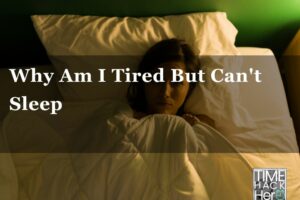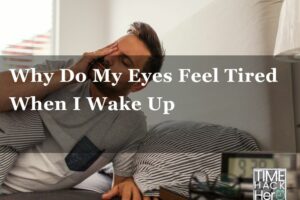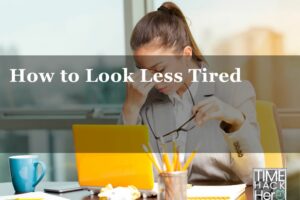It’s incredibly frustrating to feel exhausted at night but still struggle to fall asleep. Despite intense drowsiness, your mind seems to race, your thoughts won’t quiet down, and sleep evades you for hours. Why does this happen when you just want peaceful slumber?
This article explores common reasons behind the inability to sleep at night when dead tired. It outlines potential effects on health, mood, and cognition. Finally, you’ll find proven solutions to address the root causes so you can start sleeping better immediately.
Table of Contents
Is This Normal? Assessing Insomnia Symptoms
The occasional night of tossing, turning, and staring at the clock despite fatigue is normal – especially after a stressful day or drinking coffee too late. However, if you experience:
- Several nights per week unable to sleep when exhausted
- Taking over 30 minutes to fall asleep most nights
- Waking up frequently and struggling to fall back asleep
This may indicate a more concerning issue requiring lifestyle or medical intervention. While an occasional bout of insomnia when overtired is expected, consistent unrefreshing sleep warrants attention.
Common Causes of Inability to Sleep When Tired
Here are some of the most prevalent reasons you may struggle to sleep despite fatigue:
1. Stress and Anxiety
Stress and anxiety are colossal sleep saboteurs. When you feel overwhelmed mentally and emotionally, your nervous system remains revved up making it difficult to unwind at night.
Your mind races with worries, preventing you from disengaging from conscious thought long enough to drift off. Stress and anxiety also disrupt your natural circadian rhythms that regulate sleep-wake cycles.
High cortisol levels from ongoing stress inhibit quality slumber. Unresolved arguments, work stress, financial pressure, illnesses, grief, and general anxiety are examples of issues that can impose sleeplessness even when exhausted.
2. Consumption of Caffeine, Nicotine, and Alcohol
Consuming stimulants like caffeine and nicotine close to bedtime, or depressants like alcohol right before bed, can seriously disrupt your ability to fall and stay asleep.
Caffeine found in coffee, tea, soda and energy drinks is a potent anti-sleep compound. Its stimulating effects can last for several hours after ingestion. Consuming caffeine past 2 pm or in excessive amounts often sabotages sleep onset when tired.
Nicotine is also a stimulant. Smoking too close to bed or nighttime nicotine cravings inhibit your brain’s transition into sleep.
Although alcohol is a sedative that initially causes drowsiness, as it metabolizes later in the night it wakes you up. Alcohol also reduces time spent in restorative REM and deep sleep.
3. Use of Electronic Devices Before Bed
Bright light exposure from screens of phones, tablets, televisions, computers and other electronics suppresses your body’s natural melatonin release. This makes it harder for your brain to wind down for sleep. The mental stimulation from screen content also keeps your mind engaged rather than transitioning into a relaxed state.
Experts recommend avoiding electronics use within 1-2 hours of bed. Light emitted from devices tricks your brain into thinking it’s still daytime. Putting away devices early is key for being able to fall asleep when tired.
4. Irregular Sleep Schedules
Inconsistent sleep schedules from day to day disrupt your body’s natural circadian rhythms that regulate sleepiness.
When your bed and wake times differ significantly between weekends, weekdays, and daily, your biological clock gets confused. This makes it harder for sleep cues to kick in properly at night.
Aim for consistent bed and wake times within 1 hour even on free days to optimize your circadian regulation of sleep.
5. Excessive Time Awake In Bed
Spending excessive time awake in your bed either early in the night or after nighttime awakenings conditions your mind to associate being in bed with wakefulness rather than sleep.
Experts recommend getting out of bed if unable to fall asleep within 20-30 minutes, rather than laying in bed frustrated. Use these wakeful periods to engage in calm activities until more tired before returning to bed.
Limiting time awake in your sleep space strengthens the brain’s association of your bed with rapid sleep onset.
6. Hot Sleep Environment
A bedroom environment that is too warm or cold can make it difficult to fall asleep when tired. The optimal temperature for sleep is quite cool, generally between 60-67° F. Hot rooms prevent the body from naturally cooling off during sleep as needed to initiate sleepiness.
Adjust the thermostat, use lighter bedding, open windows, utilize fans, or use a mattress cooling pad to keep your sleep environment at an ideal temperature.
7. Medications That Disrupt Sleep
Certain prescription medications such as steroids, stimulants for ADHD, beta blockers, SSRI antidepressants and some diuretics are known to cause insomnia and sleep disruption as a side effect.
Over-the-counter medications like certain antihistamines, nasal decongestants, pain relievers, diuretics and stimulants found in OTC diet pills also impair sleep.
If your insomnia arose after starting a new medication, consult your physician about lower dosages, timing doses earlier, or possible alternatives. Don’t abruptly stop medication without medical guidance.
8. Underlying Health Conditions
Various medical issues can impose sleep difficulties when tired. For example:
- Chronic pain from conditions like arthritis or nerve disorders
- Neurological diseases such as Alzheimer’s, Parkinson’s, and restless leg syndrome
- Mental health disorders like depression, anxiety, and ADHD
- Respiratory illnesses such as asthma, COPD, and sleep apnea
- Gastrointestinal reflux or irritable bowel syndrome
- Hyperthyroidism
- Urinary issues like prostate enlargement
Talk to your doctor if an untreated health condition may be perpetuating your inability to sleep when tired. Appropriate medical treatment can often resolve associated insomnia.
9. Consumption of Large Meals Before Bed
Eating a sizable meal too close to bed can make falling asleep difficult due to digestive issues. Focus on eating smaller meals 2-3 hours before bedtime, and avoid spicy, fatty or acidic foods.
If you are struggling to wind down despite exhaustion, assessing aspects of your lifestyle, environment and health can pinpoint what needs to change for quality rest.
The Effects of Sleep Deprivation
Insufficient sleep takes a major toll both mentally and physically. Some key effects of tossing and turning night after night include:
Mental Effects
- Impaired concentration, focus, memory and cognition
- Increased irritability, anxiety and sadness
- Higher risk of depression
Physical Effects
- Weakened immune system and more frequent illness
- Increased risk of obesity, heart disease, stroke, diabetes
- Decreased motor coordination and increased accidents
- Aches, cramps, and general fatigue
Daily Life Effects
- Reduced motivation and energy
- Impaired work/academic performance
- Strained relationships
- Lack of interest in hobbies, exercise, socializing
Clearly, chronically sleeping poorly despite exhaustion degrades all aspects of health and happiness. Prioritizing solutions to achieve restful sleep is vital.
Tips for Falling Asleep When Tired
Use the following strategies to make falling asleep when exhausted more likely:
Keep a consistent sleep schedule – Maintain a regular bedtime and wake-up time, even on weekends and days off. Routines prime your body’s circadian clock for sleep at the desired times.
Develop a calming pre-bed routine – Unwind in dim lighting with activities like light yoga, reading fiction, or listening to soothing music to cue rest.
Make your bedroom optimal for sleep – Control temperature, light, and noise. Invest in blackout curtains, a quality mattress, and sound machine if needed. Reserve your bed for just sleep and intimacy rather than television watching.
Avoid naps unless essential – Daytime naps decrease your homeostatic sleep drive at night. If you must nap, keep it short and before 3 pm.
Limit alcohol, cigarettes, caffeine and heavy meals before bed – All of these interfere with sleep onset even when tired.
Power down electronics 1-2 hours before bed – Prevent blue light from suppressing natural melatonin release, which signals your brain to sleep.
Write down thoughts or to-do lists if your mind is racing – Dump worries out of your head onto paper through journaling to prevent ruminating in bed.
Use deep breathing and relaxation techniques in bed – Calm your nervous system through deep belly breathing, progressive muscle relaxation, visualization exercises.
Get out of bed if sleep hasn’t come within 20-30 minutes – When truly tired you should fall asleep quickly. Get up briefly to reset your sleep drive before returning to bed.
Ask your doctor about cognitive behavioral therapy for insomnia (CBTi) – CBTi effectively treats chronic insomnia through changing unhelpful thoughts and behaviors that impair sleep.
Talk to your doctor if an underlying issue may be causing your sleeplessness – Discuss any potential medications, mental health disorders, chronic illnesses or pain contributing to insomnia.
By identifying and addressing the factors interfering with sleep, you can get the restorative rest your body craves when exhausted.
When to See a Doctor
Consult your physician if:
- You consistently require more than 30 minutes to fall asleep despite fatigue
- You experience excessive daytime sleepiness
- Insomnia is accompanied by other concerning symptoms
- Sleep problems persist for over a month
- You engage in potentially dangerous activities like driving when extremely drowsy
Describe your fatigue levels, sleep difficulties, and any other symptoms. Underlying health issues may be contributing to your insomnia. Tests like overnight sleep studies can also assess for sleep disorders like sleep apnea.
Don’t lose hope if you feel chronically unable to sleep when drained. Your doctor can collaborate with you to find solutions for achieving restorative sleep and protecting your health.
Frequently Asked Questions
1. Why do I lay in bed wide awake even when extremely tired?
Common reasons include underlying anxiety keeping your mind active, environmental disruptors like light/noise, evening caffeine intake, inconsistent sleep routine, electronics use before bed, or an untreated sleep disorder like insomnia or sleep apnea preventing quality sleep.
2. How long can you go without sleep when exhausted?
While lack of sleep is unhealthy for anyone, most adults can only go without sleep for 1-3 days before impairment becomes dangerous. Microsleeps, mood changes, slowed reactions, and poor cognition kick in after just 24 hours without sleep when tired.
3. Is it better to stay awake if I can’t sleep?
If you are unable to fall asleep after 20-30 minutes in bed, it is usually better to get out of bed and engage in a quiet activity until more tired, rather than continuing to lie in bed frustrated. However, avoid screens during these awake times as the blue light impedes sleepiness.
4. What foods help you sleep when tired?
People struggle to sleep when overtired and hungry. Light carbohydrate-based snacks like whole grain cereal, oatmeal, bananas, chamomile tea, tart cherry juice, nuts, or seeds can help fuel the brain. Avoid sugar, spice and heavy meals before bed when exhausted.
5. Is melatonin safe to take if I’m tired but can’t sleep?
Melatonin can help reset your body’s sleep-wake cycle if insomnia is due to jet lag or shiftwork schedules. However, always consult your doctor before using melatonin if your inability to sleep despite fatigue is chronic. Start with proper sleep hygiene habits first.
Conclusion
Feeling completely exhausted yet unable to drift off into deep, restorative sleep is extremely aggravating. Addressing root causes like stress management, sleep environment, technology and caffeine intake, and any medical conditions is key to resolving insomnia. Consistent nights of restful sleep will have you feeling recharged and ready to thrive during your days.









